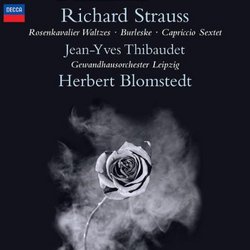| All Artists: Richard [1] Strauss, Herbert Blomstedt, Leipzig Gewandhaus Orchestra, Jean-Yves Thibaudet Title: Richard Strauss: Rosenkavalier Waltzes; Burleske; Capriccio Sextet Members Wishing: 0 Total Copies: 0 Label: Decca Release Date: 6/14/2005 Genre: Classical Styles: Chamber Music, Forms & Genres, Concertos, Instruments, Keyboard, Symphonies Number of Discs: 1 SwapaCD Credits: 1 UPC: 028947565505 |
Search - Richard [1] Strauss, Herbert Blomstedt, Leipzig Gewandhaus Orchestra :: Richard Strauss: Rosenkavalier Waltzes; Burleske; Capriccio Sextet
 | Richard [1] Strauss, Herbert Blomstedt, Leipzig Gewandhaus Orchestra Richard Strauss: Rosenkavalier Waltzes; Burleske; Capriccio Sextet Genre: Classical
This recording presents a cross-section of Strauss' compositions spanning more than half a century. The Burleske for piano and orchestra, written when he was 20, opens with a burst of youthful exhilaration and is full of c... more » |
Larger Image |

 Track Listings (4) - Disc #1
Track Listings (4) - Disc #1